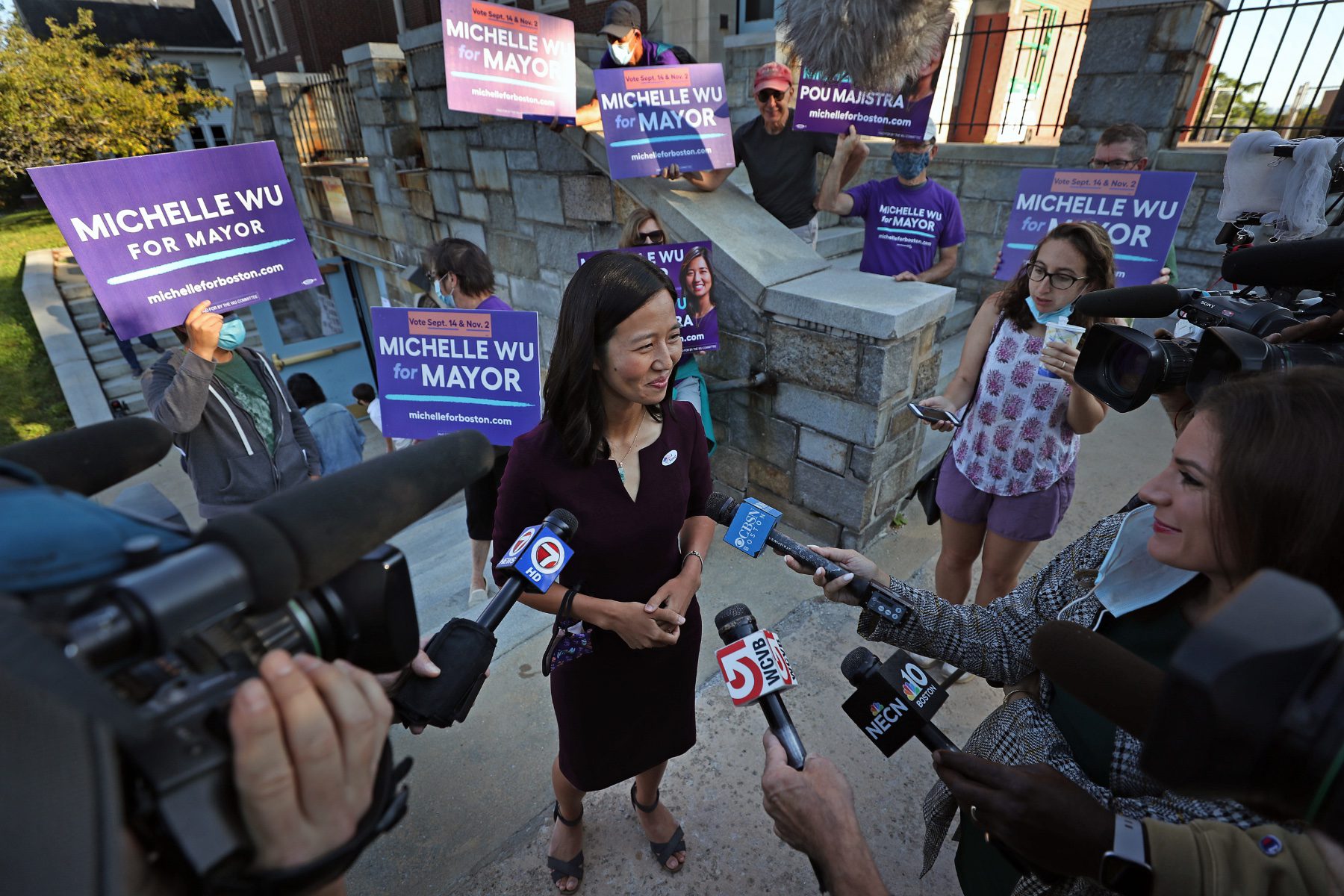Two women of color will be on the ballot in Boston’s general election for mayor in November, setting up a historic outcome when one of them is elected to the top position in a city that has exclusively elected White men to lead it.
Michelle Wu and Annissa Essaibi George, both at-large city councilors, secured the two top spots in Tuesday’s preliminary election among five major candidates, all people of color. The two-person general election is set for November 2. The other contenders in the race, city councilor Andrea Campbell, acting mayor Kim Janey and former economic development chief John Barros, conceded Tuesday.
Janey, Boston’s current mayor who was seeking a full term, became the first woman and Black person to hold the position after she was sworn in as acting mayor. (Marty Walsh stepped down as mayor to become U.S. labor secretary.) But a woman or person of color has never been elected mayor of Boston, one of the oldest cities in the country. Wu, an Asian American whose parents immigrated from Taiwan, and Essaibi George, who describes herself as a first-generation Arab-Polish American, will change that.
“That is completely new to a city that 200 years ago elected its first White man and has been electing White men ever since,” said Rachel Cobb, chair of the political science and legal studies department at Suffolk University who studies elections.
Neither Janey nor Campbell, the two Black women candidates in the race, received enough votes to advance beyond the primary. Tabitha Bonilla, assistant professor of human development and social policy at Northwestern University, said it’s too early to know whether race or local political circumstance played a role in the primary.
“It’s hard for political scientists who are doing this analysis with tons and tons of data to effectively sort out, so it could be really hard to sort out here,” she said. “We may need to do just a little bit more work to sort through what specifically happened, and it may speak to how challenges differ across different women of color.”
Erin O’Brien, associate professor of politics at University of Massachusetts Boston, said the primary “is a big deal” for Boston politics and highlights how much political calculations have changed. She suspects even a few years ago, a White cisgender man would have been in the mix of major candidates — particularly in a city with a history of racism that has permeated areas including public busing, higher education, housing and other finances.
“That to me is one of the biggest stories in this race — the number of people that didn’t jump in,” O’Brien said. “That they didn’t smell blood in the water.”
Kelly Dittmar, director of research at the Center for American Women and Politics at Rutgers University, said it also highlights the continuing evolution of representation. In recent years, an increasing number of women and women of color have been elected mayors of some of the largest cities. That can be attributed in part to a more diverse voting electorate: Census data shows people of color make up the majority of residents.
But more marginalized people are also getting involved in politics.
“There are greater opportunities for those communities that have been there all along, but may have been excluded — both in formal or informal ways — from political leadership due to the strength of party gatekeepers and party bosses,” Dittmar said.
Cobb said the diverse gender and racial makeup of the primary candidates is partly due to a “transformation” over several years on the city council, where several women and people of color have been elected including Campbell, Essaibi George, Janey, Wu and Ayanna Pressley, who is now a member of Congress. Cobb said it reflected the national trend of more diverse local governments led by women of color.
“That’s a nationwide shift, but a huge momentous historic shift for Boston itself,” she said.
Wu herself alluded to that shift in her victory speech Tuesday night, noting the increase in representation on the council.
“To my colleagues on the council, my sisters, I am so proud of where we are now and so grateful for your service,” she said.
The two-person race could be a showdown between Democratic candidates with different approaches to policy. Wu, 36, supports backing universal pre-K and child care, addressing climate change through a Green New Deal and establishing free public transportation. Essaibi George, 47, a former public school teacher, has expressed support for improving similar issues but not through such proposals. She also wants to add more resources for police and find solutions to issues like homelessness and housing affordability..
“I refuse to over-promise for political points,” Essaibi George told The Boston Globe this summer. “My plans are rooted in reality.”
Cobb said all the women in the primary brought unique lived experiences that informed policy debates during the primary.
“They’re all moms and they are talking about affordable child care, and they’re just talking about it in this way that’s really just, ‘I’ve been there. I really know this struggle. Not that I’ve observed this struggle … I know it and I live it,’” Cobb said. “I think that is different, and it’s different because it’s all of them.”
Dittmar said as the race enters a new phase, she’ll be monitoring how much of the two remaining candidates’ policy positions receive coverage versus the fact that they’re part of a historic race around their gender.
“How much will these women also be able to individualize themselves? White men are always distinguished by, ‘Well he believes this and this is his policy platform and this is what he’s done in this race.’ I think it’s a little easy to fall into, as much as we want to celebrate this sort of change.”






